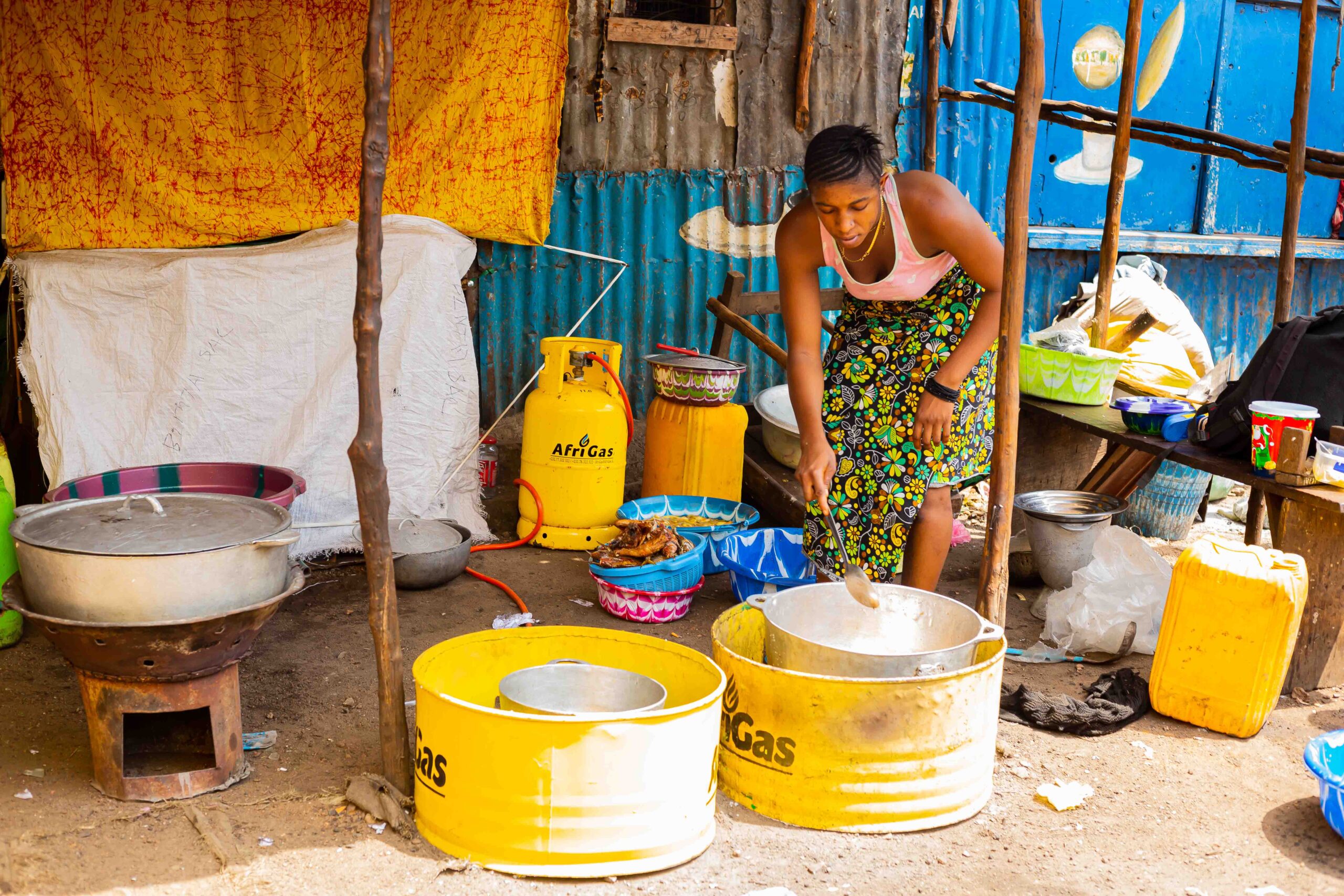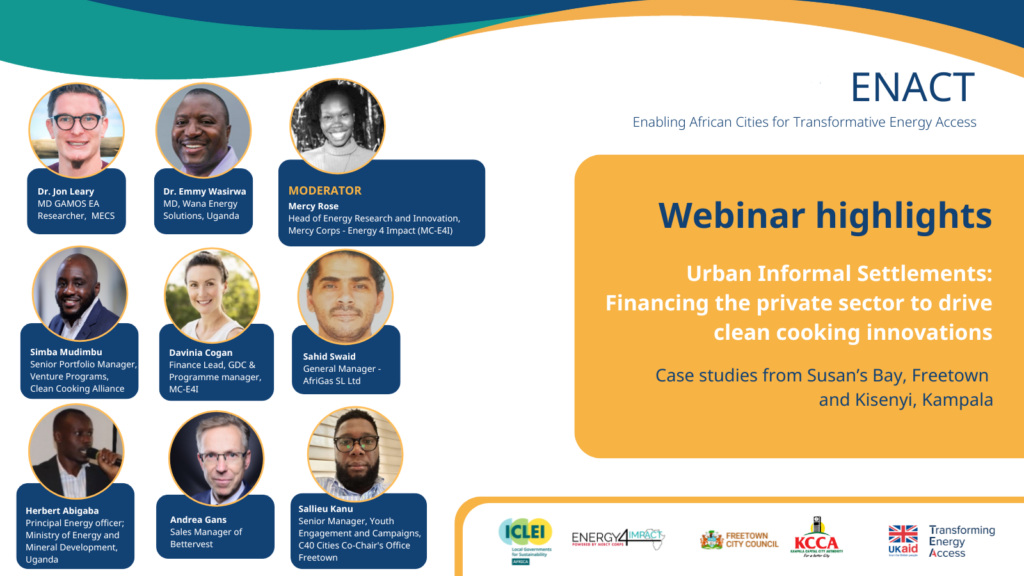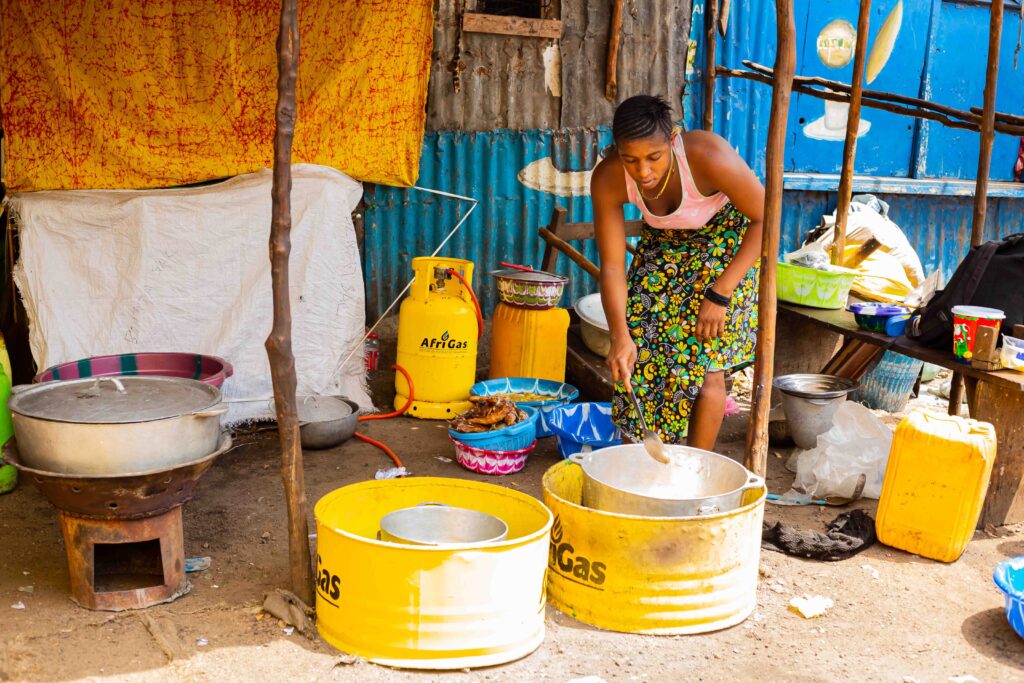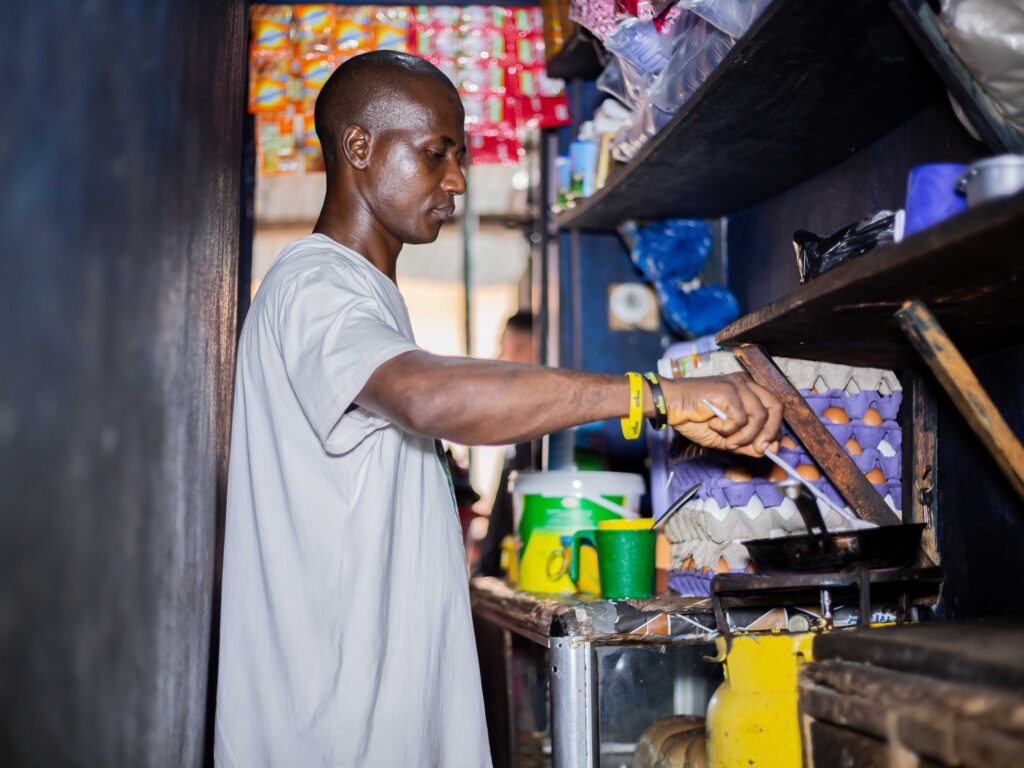16 August 2024
Driving clean cooking adoption in urban informal settlements: insights from the ENACT programme in Freetown and Kampala



Energy 4 Impact and ICLEI Africa co-hosted an insightful webinar on 18th June 2024, exploring the potential of innovative financing and public-private partnerships for advancing clean cooking solutions in urban informal settlements.

The webinar brought together clean cooking companies, policymakers, city planners and industry leaders to share their experiences of collaborating through the Enabling African Cities for Transformative Energy Access (ENACT) project, part of the UK aid-funded Transforming Energy Access (TEA) programme.
ENACT aims to improve access to adequate, safe, reliable and affordable energy in poor urban areas across sub-Saharan Africa through market-led solutions.
As Africa undergoes rapid urbanisation, access to sustainable cooking energy becomes increasingly crucial, especially in informal settlements at risk of being left behind. Currently, over 80% of households in these urban informal communities rely on charcoal and firewood for cooking, leading to severe health risks, environmental challenges, and financial burdens. In response, ENACT has been working with local partners to promote the adoption of clean cooking in the urban informal settlements of Susan’s Bay, Freetown (Sierra Leone) and Kisenyi, Kampala (Uganda).
At the project’s outset, little was known of the status of the cooking sector in informal settlements in African cities. But as the webinar revealed, ENACT and its partners have since generated a wealth of knowledge and evidence, illuminating both the challenges and potential solutions for scaling clean cooking access in such communities. This includes the importance of effective collaboration between the public and private sector to drive change.
In the first part of the webinar, the companies shared insights on how they have adapted their business models to the context of these informal settlements, while government officials from the project cities outlined the support provided as well as policies and incentives needed to scale clean cooking solutions, especially for the urban poor. In the second part, industry leaders highlighted the pivotal role of the private sector in developing affordable and sustainable solutions for the urban poor, and how to unlock the capital needed to deliver them.
Innovation and government support fuel community adoption
In 2023 and 2024, ENACT partnered with Afrigas and a consortium made up of Wana Energy Solutions and Green Bio Energy to identify viable and scalable approaches for promoting clean cooking adoption in Susan’s Bay (Freetown) and Kisenyi (Kampala) respectively. These last-mile markets pose significant challenges as well as opportunities for the private sector: affordability is a major barrier for low-income customers who also lack awareness about clean cooking solutions and confidence in their use, compounded by resistance due to the perceived dangers of cooking with new technologies. According to Afrigas and Wana Solutions, funding from ENACT was crucial to mitigate the risks of trialling their solutions within the community.
Sahid Swaid, Managing Director of the Sierra Leonean LPG supplier and distributor Afrigas, discussed how strategic local partnerships enabled his company to penetrate the Susan’s Bay market:
“We drove sales by collaborating with microfinance institutions and community organisations.”

The company also experimented with new approaches to boost LPG uptake, including the introduction of wind shields for outdoor cooking and volcano stoves for large scale cooking with gas. Afrigas also developed a shared canister model, whereby customers within a compound can share an LPG canister or an individual can rent it out for community events. To alleviate customer fears around cooking with gas, he said that Afrigas “conducted extensive sensitisation to ensure LPG was in their comfort zone.”
In Kampala, Wana Solutions is a pioneering market leader in LPG cooking solutions in Uganda with experience on the ground in urban spaces. Dr Emmy Wasirwa, CEO of Wana Energy Solutions, emphasised the importance of extensive community consultations in Kisenyi, which led to their introduction of flexible micropayment plans for customers. This approach, supported by the establishment of two distribution hubs in the community, resulted in uptake he described as “enormous.”
The success of private sector companies partly hinges on the efforts of local and national government authorities in creating a supportive environment for clean cooking initiatives. Representing the Ugandan Ministry of Energy and Mineral Development, Eng. Herbert Abigaba explained how his department is setting up “a dedicated Clean Cooking Delivery Unit to enhance coordination and knowledge management in the sector”. Enforcing safety and standardisation frameworks for appliances is a key priority, he said. He also highlighted the tax exemptions and incentives in place for clean cooking projects in Uganda, including the removal of VAT on LPG.
Similarly acknowledging clean cooking as an “essential intervention,” Sallieu Kanu from Freetown City Council underscored its critical impact on public health and deforestation. With municipal authorities facing severe financial constraints, Kanu stressed the importance of “subsidy provision from national government and collaboration with the private sector”. He cited the buy-in of microfinance institutions as “paramount” for rolling out clean cooking initiatives at scale.
Financing strategies for building clean cooking markets

In the second part of the webinar, four industry leaders shared their experiences and insights into devising strategies for financing the clean cooking transition.
Andreas Gans – from the German crowdfunding platform Bettervest – kicked off the discussion by describing how his company introduced a specialised programme to foster sizeable lending at preferential interest rates for the clean cooking sector. He explained that Bettervest “co-organised workshops with clean cooking associations to understand their members’ needs,” whilst striving to be “very open” to meeting their expectations regarding special conditions, loan sizes, periods, and securities.
Building on the theme of meeting the needs of clean cooking businesses, Davinia Cogan from the Global Distributors Collective called for more flexible grants for early-stage companies. She explained:
“Debt requires a proven track record, whilst equity is expensive, and results-based financing is suitable only for mature firms.”
In that context, Cogan argued that grants are “essential” for giving early-stage companies the leeway to analyse their unit economics and run pilots, which then helps them access blended finance and scale.
Highlighting the work of the Clean Cooking Alliance (CCA), Simbarashe Mudimbu echoed the need for support. He detailed how CCA helps clean cooking startups address business challenges, develop user-centric models and demonstrate their investment potential. Mudimbu stated that:
“Ultimately, what matters to investors is the business case, which includes correct unit economics, a compelling story about scalability or impact, and consumer financing options.”
Finally, Dr Jon Leary from the Modern Energy Cooking Solutions (MECS) programme rounded out this thought-provoking dialogue by advocating for clean cooking initiatives to adopt a multi-fuel approach. This enabled customers to build “a clean stack of solutions that meet their diverse needs,” he said. He also pointed out that residents in informal settlements often rely on illicit and dangerous connections, but adopting electric cooking can stimulate electricity demand and lead to the formalisation of connections, providing safer and better services. Leary championed investments in the digitalisation of the supply chain, noting that location tracking of appliances would greatly reduce the credit risk for suppliers.
Leveraging insights from ENACT to scale impact
The webinar confirmed that these pioneering clean cooking companies, working closely with their respective local and national government authorities, have been able to demonstrate the viability of their innovative solutions by adapting to the complexities of urban informal environments. Given Africa’s booming urban population, and the projected growth of its informal settlements, public and private stakeholders must now join forces to replicate these approaches in more cities, ensuring that urban dwellers are not left behind.
About ENACT
Funded by the UK Government through the Transforming Energy Access (TEA) platform that is managed by the Carbon Trust, the ENACT project aims to provide an enabling environment for the public and private sector to work together to improve access to clean, safe, reliable and affordable energy (particularly clean cooking) access for the urban poor living in African urban informal settlements. The current phase of the project is being implemented in Freetown and Kampala by ICLEI Africa and Energy 4 Impact. For more information about the ENACT please visit the project’s page on the ICLEI Africa website.
*This article was originally published on the Mercy Corps- Energy for Impact website.


